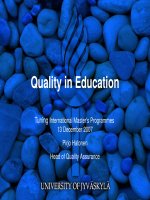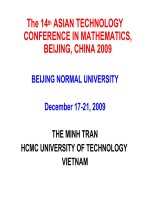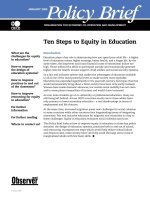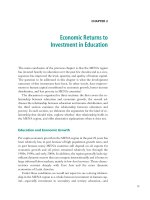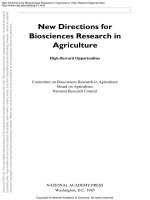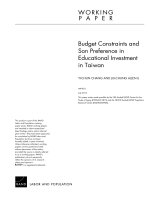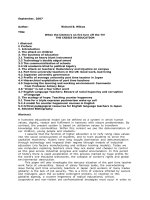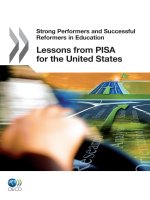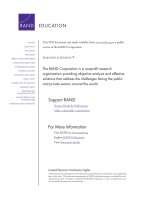advancing scientific research in education
Bạn đang xem bản rút gọn của tài liệu. Xem và tải ngay bản đầy đủ của tài liệu tại đây (4.32 MB, 138 trang )
TeAM
YYePG
Digitally signed by TeAM
YYePG
DN: cn=TeAM YYePG, c=US,
o=TeAM YYePG, ou=TeAM
YYePG, email=yyepg@msn.
com
Reason: I attest to the
accuracy and integrity of this
document
Date: 2005.06.03 18:40:04
+08'00'
ADV
ANCING
SCIENTIFIC RESEARCH
IN EDUCATION
Committee on Research in Education
Lisa Towne, Lauress L. Wise, and Tina M. Winters, Editors
Center for Education
Division of Behavioral and Social Sciences and Education
THE NATIONAL ACADEMIES PRESS 500 Fifth Street, N.W. Washington, DC 20001
NOTICE: The project that is the subject of this report was approved by the Governing
Board of the National Research Council, whose members are drawn from the councils
of the National Academy of Sciences, the National Academy of Engineering, and the
Institute of Medicine. The members of the committee responsible for the report were
chosen for their special competences and with regard for appropriate balance.
This study was supported by Contract No. ED-00-CO-0088 between the National
Academy of Sciences and the U.S. Department of Education, Grant No. 2002-7860
from the William and Flora Hewlett Foundation, and Grant No. 200200225 from the
Spencer Foundation. Any opinions, findings, conclusions, or recommendations expressed in this publication are those of the authors and do not necessarily reflect the
views of the U.S. Department of Education, the William and Flora Hewlett Foundation, or the Spencer Foundation.
Library of Congress Cataloging-in-Publication Data
National Research Council (U.S.). Committee on Research in Education.
Advancing scientific research in education / Committee on Research in Education ;
Lisa Towne, Lauress L. Wise, and Tina M. Winters, editors.
p. cm.
Includes bibliographical references.
ISBN 0-309-09321-X (pbk.) — ISBN 0-309-54598-6 (pdf )
1. Education—Research—United States. I. Towne, Lisa. II. Wise, Lauress L. III.
Winters, Tina M. IV. Title.
LB1028.25.U6N373 2004
370'.7'2—dc22
2004026249
Additional copies of this report are available from National Academies Press, 500 Fifth
Street, N.W., Lockbox 285, Washington, DC 20055; (800) 624-6242 or (202) 3343313 (in the Washington metropolitan area); Internet, .
Printed in the United States of America
Copyright 2005 by the National Academy of Sciences. All rights reserved.
Suggested citation: National Research Council. (2005). Advancing Scientific Research in
Education. Committee on Research in Education. Lisa Towne, Lauress L. Wise, and
Tina M. Winters, Editors. Center for Education, Division of Behavioral and Social
Sciences and Education. Washington, DC: The National Academies Press.
The National Academy of Sciences is a private, nonprofit, self-perpetuating society of
distinguished scholars engaged in scientific and engineering research, dedicated to the
furtherance of science and technology and to their use for the general welfare. Upon the
authority of the charter granted to it by the Congress in 1863, the Academy has a
mandate that requires it to advise the federal government on scientific and technical
matters. Dr. Bruce M. Alberts is president of the National Academy of Sciences.
The National Academy of Engineering was established in 1964, under the charter of
the National Academy of Sciences, as a parallel organization of outstanding engineers.
It is autonomous in its administration and in the selection of its members, sharing with
the National Academy of Sciences the responsibility for advising the federal government. The National Academy of Engineering also sponsors engineering programs aimed
at meeting national needs, encourages education and research, and recognizes the superior achievements of engineers. Dr. Wm. A. Wulf is president of the National Academy
of Engineering.
The Institute of Medicine was established in 1970 by the National Academy of Sciences to secure the services of eminent members of appropriate professions in the examination of policy matters pertaining to the health of the public. The Institute acts
under the responsibility given to the National Academy of Sciences by its congressional
charter to be an adviser to the federal government and, upon its own initiative, to
identify issues of medical care, research, and education. Dr. Harvey V. Fineberg is president of the Institute of Medicine.
The National Research Council was organized by the National Academy of Sciences
in 1916 to associate the broad community of science and technology with the Academy’s
purposes of furthering knowledge and advising the federal government. Functioning in
accordance with general policies determined by the Academy, the Council has become
the principal operating agency of both the National Academy of Sciences and the National Academy of Engineering in providing services to the government, the public, and
the scientific and engineering communities. The Council is administered jointly by
both Academies and the Institute of Medicine. Dr. Bruce M. Alberts and Dr. Wm. A.
Wulf are chair and vice chair, respectively, of the National Research Council.
www.national-academies.org
COMMITTEE ON RESEARCH IN EDUCATION
2004
Lauress L. Wise (Chair), Human Resources Research Organization
(HumRRO), Arlington, VA
Linda Chinnia, Baltimore City Public School System
Kay Dickersin, Department of Community Health, Brown University,
Providence, RI
Margaret Eisenhart, School of Education, University of Colorado,
Boulder
Karen Falkenberg, Division of Educational Studies, Emory University,
Atlanta, GA
Jack McFarlin Fletcher, University of Texas-Houston Health Science
Center and Center for Academic and Reading Skills
Robert E. Floden, College of Education, Michigan State University, East
Lansing
Ernest M. Henley (emeritus), Department of Physics, University of
Washington, Seattle
Vinetta C. Jones, School of Education, Howard University, Washington, DC
Brian W. Junker, Department of Statistics, Carnegie Mellon University,
Pittsburgh, PA
David Klahr, Department of Psychology, Carnegie Mellon University,
Pittsburgh, PA
Ellen Condliffe Lagemann, Harvard Graduate School of Education
Barbara Schneider, Department of Sociology, University of Chicago
Joseph Tobin, College of Education, Arizona State University, Tempe
Lisa Towne, Study Director
Tina M. Winters, Research Associate
v
Preface
T
he central idea of evidence-based education—that education policy
and practice ought to be fashioned based on what is known from
rigorous research—offers a compelling way to approach reform
efforts. Recent federal trends reflect a growing enthusiasm for such change.
Most visibly, the No Child Left Behind Act requires that “scientifically
based [education] research” drive the use of federal education funds at the
state and local levels. This emphasis is also reflected in a number of government and nongovernment initiatives across the country. As consensus builds
around the goals of evidence-based education, consideration of what it will
take to make it a reality becomes the crucial next step.
In this context, the Center for Education of the National Research
Council (NRC) has undertaken a series of activities to address issues related
to the quality of scientific education research.1 In 2002, the NRC released
Scientific Research in Education (National Research Council, 2002), a report designed to articulate the nature of scientific education research and to
guide efforts aimed at improving its quality. Building on this work, the
Committee on Research in Education was convened to advance an improved understanding of a scientific approach to addressing education prob-
1Other NRC efforts—especially the line of work that culminated in the recent report
Strategic Education Research Partnership (National Research Council, 2003b)—offer insights
and advice about ways to advance research utilization more broadly.
vii
viii
PREFACE
lems; to engage the field of education research in action-oriented dialogue
about how to further the accumulation of scientific knowledge; and to
coordinate, support, and promote cross-fertilization among NRC efforts in
education research.
The main locus of activity undertaken to meet these objectives was a
year-long series of workshops to engage a range of education stakeholders
in discussions about five key topics. Since these events provide the basis for
the committee’s conclusions and recommendations, we wish to acknowledge and thank speakers2 from each of the events for their extremely helpful contributions to our deliberations:
• Peer Review in Federal Education Research Programs. This workshop
focused on the purposes and practices of peer review in many of the federal
agencies that fund education research. Federal officials and researchers considered a range of models used across the government to involve peers in
the review of proposals for education research funding and discussed ways
to foster a high-quality portfolio. It took place on February 25-26, 2003, at
the Keck Center of the National Academies in Washington, DC. A report
of this event was issued in July 2004 and contains the committee’s conclusions and recommendations about peer review in federal agencies that support education research. It can be viewed at />11054.html.
Speakers included Diane August, August and Associates; Hilda Borko,
University of Colorado, Boulder; Steven Breckler, National Science Foundation; Susan Chipman, Office of Naval Research; Dominic Cicchetti, Yale
University; Louis Danielson, Office of Special Education Programs, U.S.
Department of Education; Kenneth Dodge, Duke University; Edward
Hackett, Arizona State University; Milton Hakel, Bowling Green State
University; Teresa Levitin, National Institutes of Health; Penelope Peterson,
Northwestern University; Edward Reddish, University of Maryland;
Finbarr Sloane, National Science Foundation; Brent Stanfield, National
Institutes of Health; Robert Sternberg, Yale University; and Grover (Russ)
Whitehurst, Institute of Education Sciences.
• Understanding and Promoting Knowledge Accumulation in Education:
Tools and Strategies for Education Research. With a focus on how to build a
2For
each speaker, we provide their affiliation at the time of the workshop.
PREFACE
ix
coherent knowledge base in education research, researchers and federal officials considered several elements of the research infrastructure, including
tools, practices, models, and standards. Fundamental questions about what
such a knowledge base might look like were also considered in this context.
It took place on June 30-July 1, 2003, at the main building of the National
Academies in Washington, DC. A summary of this event appears in this
report as Appendix B.
Speakers included Daniel Berch, National Institutes of Health;
Norman Bradburn, National Science Foundation; Claudia Buchmann,
Duke University; David K. Cohen, University of Michigan; Harris Cooper, Duke University; Ronald Ehrenberg, Cornell University; David
Grissmer, RAND Corporation; Kenji Hakuta, University of California,
Merced; Kenneth Howe, University of Colorado, Boulder; Jay Labov, National Research Council; Helen (Sunny) Ladd, Duke University; David
McQueen, Centers for Disease Control and Prevention; Hugh (Bud)
Mehan, University of California, San Diego; Gary Natriello, Columbia
University; Michael Nettles, Educational Testing Service; Barbara Rogoff,
University of California, Santa Cruz; Barbara Schneider, University of Chicago; Marilyn McMillen Seastrom, National Center for Education Statistics; Robert Slavin, Johns Hopkins University and the Success for All Foundation; Sidney Winter, University of Pennsylvania; and Lauress L. Wise,
HumRRO.
• Random Assignment Experimentation in Education: Implementation
and Implications. The evidence-based education trend has brought to the
fore decades of debate about the appropriateness of randomized field trials
in education. Far less consideration has been devoted to the practical aspects of conducting such studies in educational settings; this workshop
featured detailed descriptions of the implementation of studies using randomized field trials in education and reflections on how the current trend
to fund more of these studies is influencing states, districts, and students. It
took place on September 24, 2003, at the Keck Center of the National
Academies in Washington, DC. A summary of this event was issued in May
2004 and can be viewed at />Speakers included Robert F. Boruch, University of Pennsylvania;
Wesley Bruce, Indiana Department of Education; Linda Chinnia, Baltimore City Public School System; Donna Durno, Allegheny Intermediate
Unit; Olatokunbo S. Fashola, Johns Hopkins University; Judith Gueron,
MDRC; Vinetta C. Jones, Howard University; Sheppard Kellam, American Institutes for Research; Anthony (Eamonn) Kelly, George Mason Uni-
x
PREFACE
versity; Sharon Lewis, Council of the Great City Schools; Loretta McClairn,
Baltimore City Public School System; David Myers, Mathematica Policy
Research; and Richard J. Shavelson, Stanford University.
• Journal Practices in Publishing Education Research. Following the
more general discussion of how to build a coherent knowledge base in
education in a previous workshop, this event took up the specific case of
journals that publish education research. Editors, publication committee
members, and others involved in the production and use of journal articles
considered ways to promote high-quality education research and to contribute to the larger body of knowledge about important areas of policy and
practice. It took place on November 11, 2003, at the Wyndham City Center in Washington, DC.
Speakers included Bridget Coughlin, National Academy of Sciences;
Catherine Emihovich, University of Florida; Glenn Firebaugh, Pennsylvania
State University; Lynn Liben, Pennsylvania State University; Margaret
McKeown, University of Pittsburgh; Gary Natriello, Columbia University;
Hannah Rothstein, City University of New York; Barbara Schneider, University of Chicago; Judith Sebba, University of Sussex; Gary VandenBos,
American Psychological Association; and John Willinsky, University of British Columbia.
• Education Doctoral Programs for Future Leaders in Education Research. A final workshop focused on the professional development of education researchers, with a specific emphasis on doctoral programs in schools
of education. Deans, graduate study coordinators, foundation officials, and
policy makers came together to share observations and chart potential paths
for progress. It took place on November 12, 2003, at the Wyndham City
Center in Washington, DC.
Speakers included David K. Cohen, University of Michigan; Margaret
Eisenhart, University of Colorado, Boulder; Charles Hancock, Ohio State
University; David Labaree, Stanford University; Felice Levine, American
Educational Research Association; Steven Raudenbush, University of
Michigan; Lee Shulman, Carnegie Foundation for the Advancement of
Teaching; Joseph Tobin, Arizona State University; and Grover (Russ)
Whitehurst, Institute of Education Sciences.
Additional information on each of these events and speakers, including transcripts of each workshop, can be found at http://www7.
nationalacademies.org/core/. Appendix A is a compilation of the workshop
PREFACE
xi
agendas. This report is a synthesis of themes and recommendations that
emerged from the workshop series viewed as a whole.
Of course, without the generous support of our sponsors, neither the
workshop series nor this report would be possible. We extend our gratitude
to the former National Educational Research Policy and Priorities Board
and the Institute of Education Sciences, the William and Flora Hewlett
Foundation, and the Spencer Foundation for their support and guidance.
We extend our thanks to each of the members of the Committee on
Research in Education (see Appendix C for biographical sketches). We
especially appreciate the efforts of the workshop planning groups, who
designed a series of outstanding events on important topics in education
research and policy. Several NRC staff played critical roles in shaping the
workshops and deserve special recognition: Tina M. Winters served as the
research associate throughout the project, applying her considerable talents to a range of project tasks, including the development of the knowledge accumulation workshop; Meryl Bertenthal ably led the staff effort
in developing the agenda for the peer review workshop. And we thank
Christine McShane and Eugenia Grohman for their skillful editing of the
manuscript.
This report has been reviewed in draft form by individuals chosen for
their diverse perspectives and technical expertise, in accordance with procedures approved by the NRC’s Report Review Committee. The purpose of
this independent review is to provide candid and critical comments that
will assist the institution in making its published report as sound as possible and to ensure that the report meets institutional standards for objectivity, evidence, and responsiveness to the study charge. The review comments and draft manuscript remain confidential to protect the integrity of
the deliberative process.
We wish to thank the following individuals for their review of this
report: Mary E. Dilworth, Research and Information Services, American
Association of Colleges for Teacher Education, Washington, DC; Emerson
J. Elliott, Program Standards Development Project, National Council for
the Accreditation of Teacher Education, Washington, DC; Gary J.
Natriello, Department of Sociology and Education, Teachers College, Columbia University; Penelope L. Peterson, School of Education and Social
Policy, Northwestern University; Barbara Rogoff, Department of Psychology, University of California, Santa Cruz; Nora Sabelli, Center for Technology and Learning, SRI International, Menlo Park, CA; Morton M.
Sternheim, STEM Education Institute, University of Massachusetts,
xii
PREFACE
Amherst; Jeanine P. Wiener-Kronish, Department of Anesthesia and
Perioperative Care, Cardiovascular Research Institute, University of California, San Francisco; Suzanne M. Wilson, Department of Teacher Education, Center for the Scholarship of Teaching, Michigan State University;
Mary Yakimowski, Research, Evaluation and Accountability Department,
Baltimore City Public Schools.
Although the reviewers listed above have provided many constructive
comments and suggestions, they were not asked to endorse the conclusions
or recommendations, nor did they see the final draft of the report before its
release. The review of this report was overseen by Robert L. Linn, School of
Education, University of Colorado, Boulder. Appointed by the National
Research Council, he was responsible for making certain that an independent examination of this report was carried out in accordance with institutional procedures and that all review comments were carefully considered.
Responsibility for the final content of this report rests entirely with the
authoring committee and the institution.
Lauress L. Wise, Chair
Lisa Towne, Study Director
Committee on Research in Education
Contents
EXECUTIVE SUMMARY
1
1
INTRODUCTION
Context and Rationale, 9
Strands of Work, 11
Sources of Evidence and Nature of Recommendations, 14
Defining the Parameters, 15
Target Audience, 16
Strategic Objectives, 17
9
2
PROMOTING QUALITY
Elements of Quality, 20
Mechanisms for Promoting Quality, 22
Conclusion, 33
19
3
BUILDING THE KNOWLEDGE BASE
Framing Concepts, 36
Mechanisms for Building the Knowledge Base, 38
Conclusion, 55
36
4
ENHANCING PROFESSIONAL DEVELOPMENT
Nature of the Field, 56
Mechanisms for Enhancing Professional Development, 57
Conclusion, 71
56
xiii
xiv
5
CONTENTS
SUMMARY AND CONCLUSION
Recommendations, 72
Recommendations by Target Audience, 74
Issues for Future Consideration, 77
Conclusion, 80
REFERENCES
APPENDIXES
A Workshop Agendas
B Understanding and Promoting Knowledge Accumulation:
Summary of Workshop Key Points
C Biographical Sketches of Committee Members and Staff
72
81
87
97
115
ADV
ANCING
SCIENTIFIC RESEARCH
IN EDUCATION
Executive Summary
T
he title of this report reveals its purpose precisely: to spur actions
that will advance scientific research in education. Our recommendations for accomplishing this goal build on the National Research
Council report Scientific Research in Education. That report offered an
articulation of what constitutes high-quality scientific inquiry in education; this report recommends ways to promote it.
Two pieces of recent federal legislation—the No Child Left Behind
Act of 2001 and the Education Sciences Reform Act of 2002—have catapulted education research into the spotlight. Both acts are premised on the
idea that education research can and should contribute to policy and
practice, that education should be an evidence-based field. At the same
time, the inclusion of definitions of what constitutes “scientifically based
research” in both acts reflects deep skepticism about the quality and rigor
of education research.
Some education research lacks quality, just as does some research in
medicine, neuroscience, economics, or any other field. It is not necessary
to denigrate or to defend the field on this point. The point is that scientific
research in education can be improved, and the field should focus its
energies on doing so.
The National Research Council convened the Committee on Research in Education to foster high-level dialogue with key participants in
1
2
ADVANCING SCIENTIFIC RESEARCH IN EDUCATION
education research to promote such improvements. To carry out this task,
the committee organized a five-part workshop series and published several
reports on selected topics.
In this final report, we offer recommendations for improving scientific research in education, organized around three strategic objectives:
promoting quality, building the knowledge base, and enhancing the professional development of researchers. This is a time of unprecedented
opportunity for education researchers to initiate bold reforms. The enthusiasm—and angst—surrounding recent calls for “scientifically based research” can and should be harnessed to advance the field of education
research. The time to act is now.
PROMOTING QUALITY
The intellectual predecessor to this report, Scientific Research in Education, was an attempt to articulate what is meant by quality with respect
to scientific research in education. The definition is a combination of six
guiding principles that underlie all scientific fields, along with several
features of education that shape how these principles apply to research on
teaching, learning, and schooling. We adopted that framework as our
working definition of quality of scientific education research.
Recently, much attention has been focused on “upgrading” the methods used in education studies, with a particular emphasis on randomized
field trials to help establish cause-and-effect relationships. Methodologies
are the tools researchers use to do their work; their appropriate use is
essential to promoting quality. However, matching appropriate methods
to research questions is a necessary but not sufficient condition for ensuring scientific rigor. We conclude that the national conversation about
methodological quality is but a part of a needed broader focus on how to
define and uphold quality in scientific education research. Issues such as
the development of theory and the use of replications to clarify
generalizability are examples of aspects of scientific quality that are equally
important to consider.
Our recommendations for ways to promote quality—broadly defined—
focus on peer review systems in federal agencies that support education
research, the implementation of research designs in school settings, and
partnerships between researchers and school personnel.
EXECUTIVE SUMMARY
3
Recommendation 1. In federal agencies that support education
research, the criteria by which peer reviewers rate proposals should
be clearly delineated, and the meaning of different score levels on
each scale should be defined and illustrated. Reviewers should be
trained in the use of these scales. Defining, revisiting, and upholding
standards of quality in the peer review process enhances the development of high-quality education research over time by facilitating reliable and valid ratings of proposals for funding and feedback to applicants.
Recommendation 2. Federal agencies that support education research should ensure that as a group, each peer review panel has
the research experience and expertise to judge the theoretical and
technical merits of the proposals it reviews. In addition, peer review panels should be composed so as to minimize conflicts of
interest, to balance biases, and to promote the participation of
people from a range of scholarly perspectives and traditionally
underrepresented groups. The group of peer reviewers assembled to
judge education research proposals should have the expertise to judge
the content areas of the proposed work, the methods and analytic techniques proposed to address the research question, and the policy and
practice contexts in which the work is situated. Agency staff should
seek to eliminate conflicts of interest among reviewers. However, because many of the best reviewers are likely to have some association
with applicants, overly restrictive conflict of interest rules can dramatically shrink the pool of competent reviewers. Biases among peer reviewers need not be eliminated, but rather must be identified, discussed among the group, and balanced across panelists. Ensuring a
breadth of perspectives in peer review panels promotes high-quality
reviews over time by engaging different kinds of expertise and insights
around a common set of proposals, issues, and evaluation criteria.
Recommendation 3. In research conducted in educational settings,
investigators must not only select rigorous methods appropriate to
the questions posed but also implement them in ways that meet
the highest standards of evidence for those questions and methods.
The choice of research design and method must be driven by the par-
4
ADVANCING SCIENTIFIC RESEARCH IN EDUCATION
ticulars of the question posed for investigation. The implementation of
the design in school settings is equally important: challenges arise in
working with schools, and strategies must be in place to anticipate
them and to solve unanticipated problems as they arise. Partnerships
between the research team and school personnel facilitate effective
implementation.
Recommendation 4. Federal agencies should ensure appropriate
resources are available for education researchers conducting largescale investigations in educational settings to build partnerships
with practitioners and policy makers. Time and money are needed
to develop the partnerships necessary to ensure effective implementation of large-scale education research studies. Research project budgets
should provide such resources.
BUILDING THE KNOWLEDGE BASE
Even if the quality of discrete education research projects has been
ensured, if the field lacks the will or the tools to forge connections among
studies, it will amass a multitude of studies that cannot support inferences
about generalizability nor sustain the theory building that underlies scientific progress. We conclude that greater attention must be paid to reanalysis, replication, and testing the boundaries of theories with empirical
inquiries, as well as to taking stock of what is known in areas of interest to
education policy and practice on a regular basis.
Our recommendations for building the knowledge base focus on data
sharing, infrastructure development, and journal policies.
Recommendation 5. Professional associations involved in education research should develop explicit ethical standards for data
sharing. The American Educational Research Association and similar
groups should be at the forefront of efforts to promote the sharing of
education-related data among qualified investigators to enable reanalyses, replications, and further investigation with available data. Ethical
standards should consider how to ensure the confidentiality of research
participants, especially with qualitative data. The rights and protections of authors should also be specified.
EXECUTIVE SUMMARY
5
Recommendation 6. Education research journals should require
authors to make relevant data available to other researchers as a
condition of publication and to ensure that applicable ethical standards are upheld. Cultural barriers and institutional disincentives that
work against data sharing and related practices should be addressed
candidly and reformed thoughtfully.
Recommendation 7. Professional associations and education research journals should work in concert with funding agencies to
create an infrastructure that takes advantage of technology to facilitate data sharing and knowledge accumulation in education research. Promising mechanisms include data repositories, registries of
initiated studies, bibliographic indexes of published studies, digitization of journal content, and open access.
Recommendation 8. Education research journals should develop
and implement policies to require structured abstracts. Abstracts
are used in the development of systematic reviews of multiple education studies on similar topics to identify the universe of relevant
research. To facilitate these reviews and to promote better access to
relevant studies among the many consumers of education research, all
abstracts should contain basic information about the purpose, sample
strategy, methodology, and other key features of the investigation.
ENHANCING PROFESSIONAL DEVELOPMENT
A diverse pool of well-trained education researchers is needed to contribute to deliberations about educational practice and policy in response
to the complex questions being asked of education research. The question
is: Are existing training and professional development activities sufficient
to produce a capable cadre of investigators and to respond to the demands
of practitioners and policy makers?
Our recommendations for improving the professional development of
education researchers focus on doctoral programs in schools of education,
and the peer review systems in both federal agencies and in journals.
6
ADVANCING SCIENTIFIC RESEARCH IN EDUCATION
Recommendation 9. Schools of education that train doctoral students for careers in education research should articulate the competencies those graduates should know and be able to do and
design their programs to enable students to develop them. The
articulation of competencies is essential for designing course work,
organizing research experiences, and developing other program elements. Such an exercise would also define a minimum breadth of skills
all would-be education researchers should have. This articulation may
require differentiation within programs of schools of education, such
as educational psychology and curriculum and instruction.
Recommendation 10. Schools of education that train doctoral students for careers in education research should design their programs to enable those students to develop deep substantive and
methodological knowledge and skill in a specialized area. As students progress through their doctoral training, their course work and
research experiences should hone their skills and understanding in the
theoretical ideas, methodological tools, and existing research in the
particular area in education research they intend to pursue. Interdepartmental collaborations can often facilitate in-depth training by providing opportunities for students to explore areas and to work with
faculty outside schools of education.
Recommendation 11. Schools of education that train doctoral students for careers in education research should provide those students with a variety of meaningful research experiences. Research
experience while in training is absolutely essential to a research career.
Staging a series of research experiences over the course of doctoral study
facilitates the development of research skills and provides opportunities for publishing research findings in peer-reviewed journals, presenting at conferences, and participating in other activities that are the
foundation of the profession. Ensuring meaningful research experiences for doctoral students requires that they engage in research under
the guidance of multiple faculty members who themselves are active in
the field.
EXECUTIVE SUMMARY
7
Recommendation 12. Peer review panels in federal agencies that
fund education research should be composed to promote the participation of people from a range of scholarly perspectives and
traditionally underrepresented groups and provide opportunities
for professional development. Although not typically viewed as a
vehicle for professional growth, properly designed peer review experiences can provide opportunities for interaction, feedback, and interdisciplinary conversations that promote learning among applicants,
reviewers, and agency staff. Such design features as standing panels,
which enable interactions over time, and clear and consistent feedback
to applicants can be effective ways to promote this professional development.
Recommendation 13. Publishers of peer-reviewed education research should design their editorial and manuscript review systems to promote the professional development of education researchers who participate in that process. Just as peer review of
research proposals can be an enriching experience for those involved,
so too can the process of judging manuscripts submitted to journals
for publication. Opportunities for editors, authors, and reviewers to
benefit from each others’ ideas and critiques should be maximized.
We call on the three major institutions to which these recommendations are addressed—federal funding agencies, schools of education and
universities, and professional associations—to work together towards promoting quality, building the knowledge base, and enhancing the professional development of researchers. A shared commitment among them can
lead to the partnerships, strategic investments, and infrastructure support
needed to advance scientific research in education.
